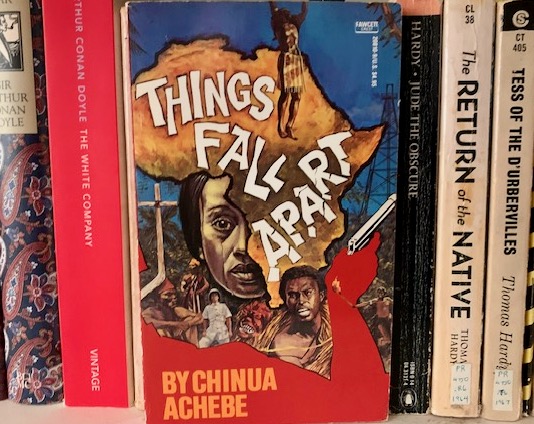Nigerian author Chinua Achebe’s acclaimed 1958 novel Things Fall Apart is alphabetically first on my list of the “100 Most Lovable Novels in the English Language.” It was the first book by a native African writer to receive worldwide fame, and is a staple of post-colonial literature. It is on the list of Time Magazine’s “100 best English-language novels published since 1923” (2005); Penguin Publishing’s list of “100 Must-Read Classics” (2022); The Observer’s list of “The 100 Greatest Novels of All Time” (2003); and the “Top 100 works of World Literature,” sponsored by the Norwegian Nobel Institute” (2002). It also was ranked number 9 on The Times‘ list of “The 50 Best Books of the past 100 Years” and number 5 on the BBC’s list of “The Top 100 Stories that Shaped the World.” Most impressively, it was named by Encyclopedia Brittanica as one of their “12 Novels Considered the Greatest Book Ever Written.”
https://drcarlosarzabe.com/dr-carlos-arzabe/ Achebe’s novel follows the life of Okonkwo, an Igbo man belonging to the fictional Nigerian clan of Umuofia. He’s a man of some stature in his community, the local wrestling champion and a self-made respected man of some wealth in his village. Motivated by the desire to rise above the legacy of his own father, who had left a reputation for weakness and unpaid debts, Okonkwo is obsessed with his image of masculinity and his determination never to show weakness. But his obsessions lead to tragic consequences in the novel.
The book is in three parts: The first introduces Okonkwo, his family, and the society of the Igbo. In the second part, Okonkwo is forced into exile to atone for accidentally killing a fellow tribesman. While he is away, white Christian missionaries infiltrate his village and spread their new religion, which his son Nwoye accepts. In part three, Okonkwo runs afoul of the new colonial government and tragedy results. Perhaps Achebe sums up Okonkwo’s character best in this statement:
Perhaps in his heart Okonkwo was not a cruel man. But his whole life was dominated by fear, the fear of failure and of weakness.
In part I, the elders of Okonkwo’s village select him to be guardian of Ikemefuna, who has joined Okonkwo’s village as a “peace settlement”–basically a hostage–because the boy’s father had killed a woman from Umujofia. Okonkwo treats the boy almost like another son, and the boy looks up to him as he might his own father. Unfortunately, the village elders decree that Ikemefuna must be killed, and although he is cautioned not to take any part in the execution, Okonkwo–unwilling to be thought weak under any circumstances, as we’ve seen–performs the execution himself, only to be haunted by it afterwards.
What gets Okonkwo exiled to Mbanta, his mother’s village, is the accidental killing of his friend Ezeudu’s son. during his seven-year exile, Okonkwo learns that white men have come to Umuofia and have been trying to convert his villagers to their Cristian religion. As one of Okonkwo’s friend tells him,
The white man is very clever. He came quietly an peaceably with his religion. We were amused at his foolishness, and allowed him to stay. Now he has won our brothers, and our clan can no longer act like one. He has put a knife on the things that held us together, and we have fallen apart.
It is a significant blow to to Okonkwo that his own son, Nwoye, leaves his father’s home after one last beating (he has always been very hard on his son, in whom he believes he sees signs of his own father’s weakness). and Nwoye proceeds to join the Christians. When another native religious ceremony and unmasks one of the village elders playing the part of an ancestral spirit of the people, violence erupts. I won’t go into detail so as not to add “a spoiler to this review, but I will repeat one of the things that Achebe writes that helps explain the disastrous effects of colonization on native peoples:
The world has no end, and what is good among one people is an abomination with others.
Achebe’s novel utilizes traditional Western literary patterns as well as the English language, and is in many ways a response to Conrad’s Heart of Darkness while borrowing its title from a poem by William Butler Yeats. But Achebe subverts western colonization by showing the pre-colonial culture of the Igbo as a complex, well-structured society, perfectly competent at governing itself, and not as a tribe of savages in need or civilizing by western powers. And it was the first of its kind to show the ugly face of colonialism to the colonial powers in their own language. And that’s why it belongs on this list.

